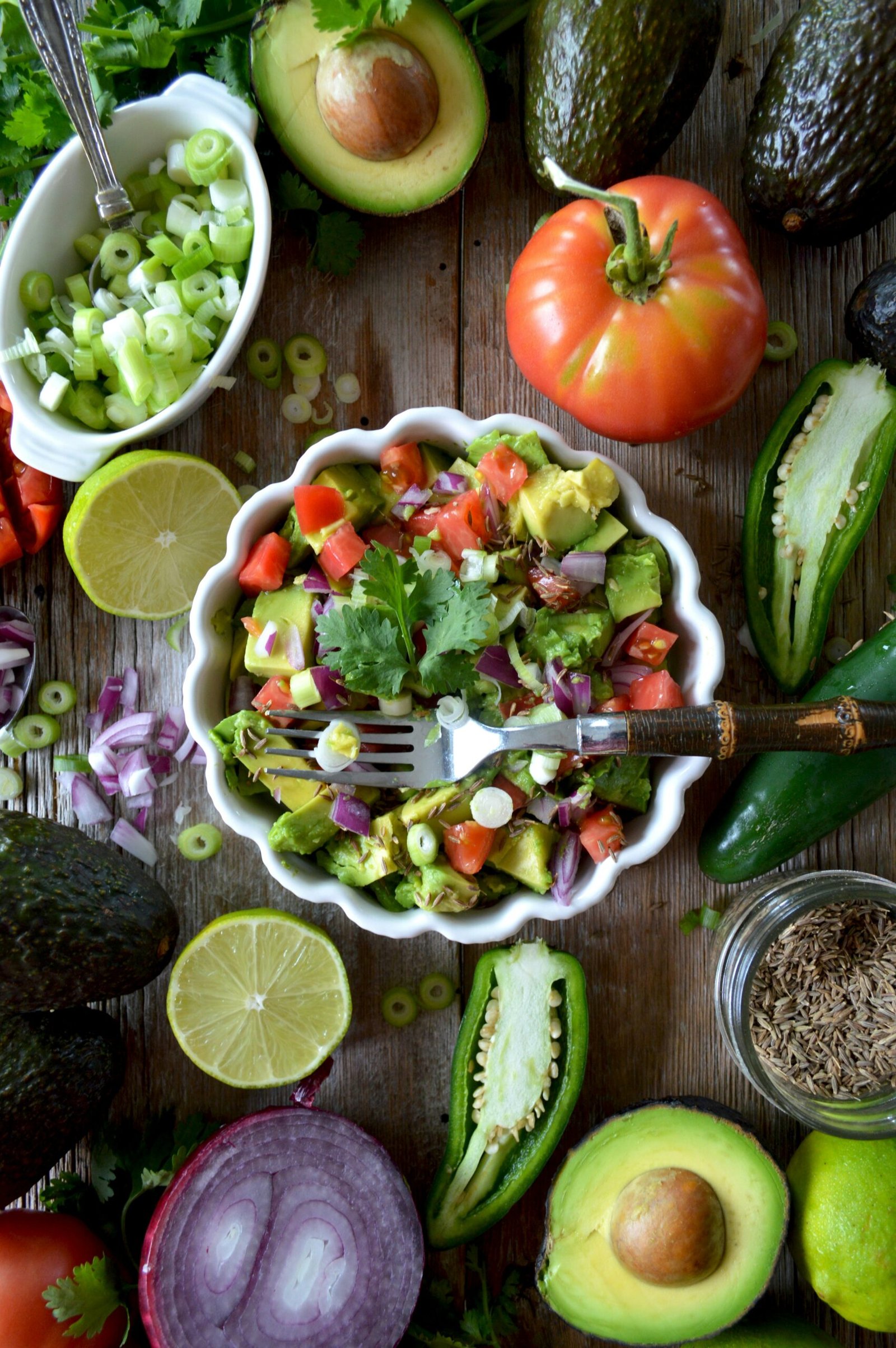
Discover the Power of Plant-Based Protein Bars
More and more people are choosing plant-based protein bars and vegan options. They see the value of protein in their diet and want something healthy and easy. Vegan Power Pro, for example, uses top-notch pea and rice proteins1.
This move towards plant-based bars is not just about health. It’s also about caring for the planet and choosing sustainable food.
The variety in plant-based protein bars is impressive. Opti-Greens 50 and Opti-Reds 50, for instance, mix different ingredients for wellness1. They help with losing fat, building muscle, and boosting immunity. Plus, they’re free from bad stuff like artificial flavors, gluten, and animal products1.
Whether you’re a vegan athlete or just want a clean supplement, there’s a bar for you.
Key Takeaways
- Plant-based protein bars are a convenient and healthy option for those looking for a meatless alternative.
- Vegan protein bars are designed to support overall wellness and are free from artificial flavors, gluten, and animal products1.
- Products like Opti-Greens 50 and Opti-Reds 50 offer unique blends of ingredients to support immunity, gut health, and natural energy1.
- Plant-based protein bars are tailored to meet the needs of both dedicated vegan athletes and individuals seeking clean plant-based supplements1.
- The market for plant-based protein bars is diverse, with a wide range of products available to suit different needs and preferences.
- Plant-based protein bars can support fat loss, muscle building, and immune health1.
What Are Plant-Based Protein Bars?
Plant-based protein bars are a tasty and convenient way to get protein. They are great for those searching for best plant-based protein bars or organic plant protein bars. These bars use ingredients like pea protein, rice protein, and hemp protein. They offer all the amino acids your body needs.
The market for these bars has grown a lot, with a 10.4% annual increase in the last five years. Experts predict this growth will continue2.
Some top best plant-based protein bars include Larabars, Evo Hemp Pineapple Almond Fruit & Nut Bar, and Rise Bars. They come in many flavors and are good for you3. When picking a bar, look at the ingredients, nutrition, and cost. Plant-based bars are about 15% pricier than animal-based ones, showing their value2.
If you want organic plant protein bars, try ALOHA Organic Protein Bars or Raw Rev Glo Protein Bars. They have top-notch, organic ingredients and are very nutritious3. For more info on plant-based protein bars and their benefits, check out healthyshopperplacer.com. There, you can compare products and find the perfect one for you.
Benefits of Plant-Based Protein Bars
Plant-based protein bars are great for those looking for a healthy, sustainable protein source. They’re perfect for vegetarians who need a quick protein fix4. These bars are not just good for you; they also help with muscle recovery and growth. This makes them ideal for anyone who exercises a lot.
Choosing plant-based protein bars is good for the planet too. They help cut down on greenhouse gas emissions and save water5. Plus, many of these bars don’t have gluten, which is great for people with certain dietary needs. Gluten-free plant-based protein bars also have more fiber than regular bars, up to 20% more6.
Here are some key benefits of plant-based protein bars:
- They have lots of protein to help muscles grow and recover.
- They’re gluten-free and low in sugar, fitting many diets.
- They’re better for the environment, reducing harm to our planet.
- They’re full of fiber, which is good for your digestion and keeps you full.
In summary, plant-based protein bars are a smart choice for anyone looking for a healthy protein source. They’re packed with protein, gluten-free, and made in a way that’s kind to the planet456.
| Benefits | Description |
|---|---|
| Nutritious Alternative | High protein content, rich in fiber, and low in sugar |
| Sustainable | Reduced greenhouse gas emissions and water usage |
| Gluten-Free | Suitable for those with dietary restrictions |
Popular Types of Plant-Based Protein Bars
There are many natural plant protein bars to choose from. Pea protein, brown rice protein, and hemp protein bars are among the favorites. They’re made from quality plant-based ingredients and are easy to grab for a protein boost.
Brands like Bulletproof and 1st Phorm offer bars with 11 to 15 grams of protein per serving7. GoMacro Bars have 10 to 12 grams of protein7. Clif’s white chocolate macadamia nut bar has 9.8g of protein in every 68g bar8.
These top plant-based protein bars taste great and are good for you. They’re gluten-free, dairy-free, and made with natural ingredients. So, finding a bar that fits your taste and diet is easy.
Plant-based protein bars are also a healthy snack option. They provide important nutrients and help with muscle recovery9. They’re perfect for a quick energy boost or a post-workout snack.
How to Choose the Right Plant-Based Protein Bar
Choosing the right plant-based protein bar is key. With many options, it can feel overwhelming. Plant-based snack bars are a healthy and sustainable choice.
Start by reading nutrition labels carefully. Look for high-quality ingredients and a good mix of protein, fats, and carbs. Some bars offer 5 to 20 grams of protein, helping with muscle recovery and energy10. Think about your dietary needs, like gluten-free or vegan options.
Here are some key things to think about when picking a plant-based protein bar:
- Protein content: Aim for bars with at least 10 grams of protein per serving.
- Ingredient quality: Opt for bars with whole, easy-to-recognize ingredients.
- Allergen warnings: Watch out for common allergens like nuts or soy.
By considering these points and picking a best plant-based protein bar that fits your needs, you can enjoy a healthy snack. It will support your overall health and well-being.
Homemade Plant-Based Protein Bar Recipes
Making your own plant-based protein bars at home is fun and rewarding. With just a few ingredients, you can create tasty and healthy bars. These bars are perfect for those who follow a vegan diet or need gluten-free options.
Some bars have about 296 calories, 38g of carbs, 12g of protein, 16g of fat, and 4g of fiber per serving11. Others have around 317 calories, 17g of fat, 10g of protein, and 24g of sugar per bar12. You can also find bars with over 10 grams of protein per serving12. Making vegan protein bars at home takes just 10 minutes, making them a quick snack13.
Simple No-Bake Recipes
No-bake recipes are great for homemade protein bars. They are simple to make and need just a few ingredients. You can keep them in the fridge for up to 2 weeks or freeze for up to 3 months11. Some can be frozen for up to 3 months12 and13.
Flavor Variations to Try
There are many flavors you can try with homemade protein bars. Use different nuts, seeds, and dried fruits for unique tastes. Some recipes are sugar-free, gluten-free, dairy-free, and soy-free, making them great for those with dietary restrictions13.
Tips for Perfecting Your Bars
To make perfect bars, use a food processor to mix the ingredients well13. You can also customize the recipe by adding different fruits or skipping the chocolate layer13. With practice, you can make delicious and healthy bars for snacking on the go.
| Recipe | Calories | Protein | Fat | Fiber |
|---|---|---|---|---|
| Homemade Vegan Protein Bars | 296 | 12g | 16g | 4g |
| Gluten-Free Plant-Based Protein Bars | 317 | 10g | 17g | 24g |
Where to Buy Plant-Based Protein Bars
Plant-based protein bars are easy to find in stores and online. You can check out local health food stores or online retailers. They offer a wide variety of plant-based protein bars and vegan protein bars.
Online, you can find them on Amazon, Thrive Market, and Vitacost. These sites have many brands to choose from. They saw a 28% increase in sales after making their checkout easier. Customers who bought these bars and other health items spent 35% more than those who just bought bars14.
Local health food stores also have a good selection of plant-based protein bars and vegan protein bars. Look for brands like Clif Bar, RXBAR, and Quest Nutrition. It’s important to check the ingredients and nutritional value. 92% of people like to buy from places that give this info14.
Here are some benefits of buying plant-based protein bars online:
- Convenience: You can shop from home.
- Wide selection: Online stores have more products than local ones.
- Competitive prices: Online, you might find better deals.
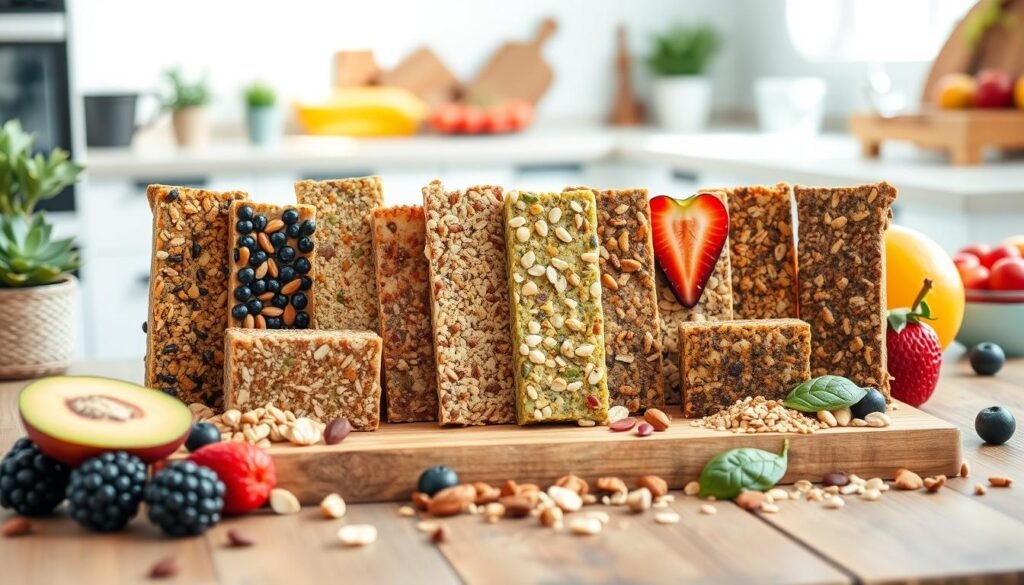
Whether you shop online or in-store, you have many choices for plant-based protein bars and vegan protein bars. Think about ingredients, nutritional value, and price. This way, you can find the best one for you14.
Comparing Plant-Based Protein Bars with Traditional Bars
Choosing a protein bar can be tricky, with many options available. Plant-based bars, like those with pea or hemp protein, are a natural and green choice15. Traditional bars, made with whey or casein, are another option16.
Plant-based bars have 5 to 20 grams of protein, helping with muscle recovery and energy15. Traditional bars have 15 to 30 grams of protein per serving16. Plant-based bars also tend to be lower in calories, fat, and cholesterol17.
Here is a comparison of the nutritional content of plant-based and traditional protein bars:
| Bar Type | Protein Content | Calories | Fat | Cholesterol |
|---|---|---|---|---|
| Plant-Based | 5-20g | 100-200 | 2-5g | 0-5mg |
| Traditional | 15-30g | 200-300 | 5-10g | 10-20mg |
The choice between plant-based and traditional bars depends on personal taste and dietary needs. Plant-based bars are a natural and eco-friendly choice151617. Traditional bars offer a more classic protein source151617.
Factors to Consider for Athletes
Athletes need a certain amount of protein to grow and recover muscles. The best plant-based protein bars can meet this need. Sports nutritionists say athletes should pick a bar based on their protein needs18. The U.S. government recommends 0.8 grams of protein per kilogram of body weight19.
When to eat these bars is also important. Athletes should eat a bar 30-60 minutes after working out to help muscles recover18. The top plant-based protein bars offer the right mix of protein and nutrients for athletes. Some research shows vegan diets can boost nutrients like nitrate and polyphenols, which help athletes perform better20.
Here’s what athletes should keep in mind:
- Protein needs and recommended intake
- Timing of consumption
- Choosing the best plant-based protein bars
| Protein Source | Recommended Intake |
|---|---|
| Plant-based protein bars | 0.8 grams per kilogram of body weight |
| Vegan diet | 0.66 grams of protein per kilogram of body weight |
Athletes can gain from adding best plant-based protein bars to their diet. They should think about their protein needs and when to eat them181920.
Addressing Common Myths About Plant-Based Protein Bars
Many people think plant-based protein bars are not complete proteins, missing essential amino acids21. But, eating a mix of plant-based protein sources like legumes, whole grains, nuts, and seeds can fix this22.
Another myth is that vegan protein bars have less protein than animal-based ones23. This isn’t always true. Many plant-based bars are made to give enough protein for muscle growth and recovery. Foods like lentils, chickpeas, and tofu are also packed with protein21.
It’s key to know the truth about plant-based protein bars. By understanding their benefits and debunking myths, people can make better diet choices. This way, they can follow a plant-based lifestyle that fits their health and values22. With so many options out there, finding a tasty and healthy bar is easy.
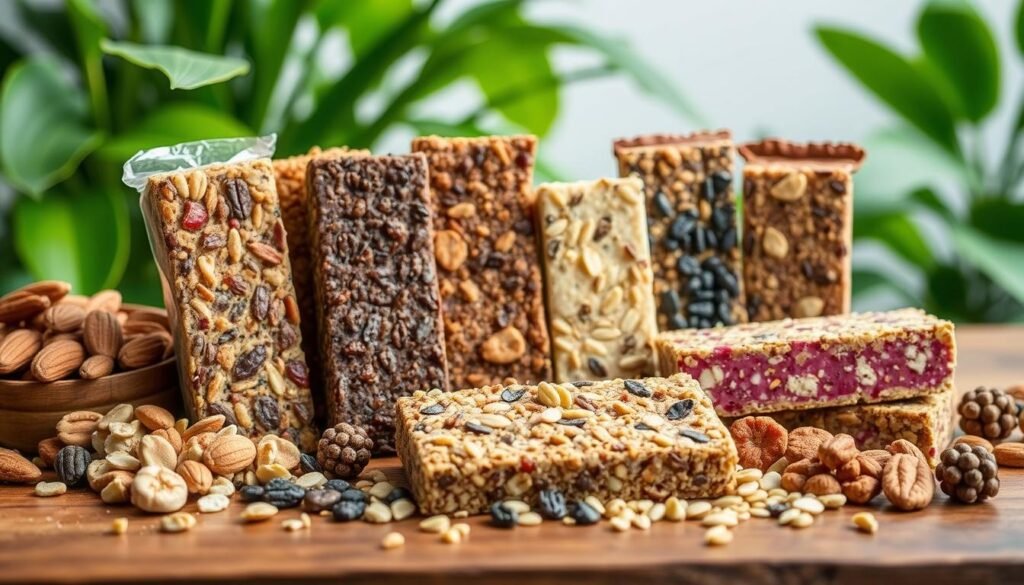
Plant-based protein bars offer many advantages. They have less saturated fat and cholesterol, more fiber, and are better for the environment21. Plus, many vegan protein bars use natural ingredients and avoid artificial stuff23. Choosing a plant-based protein bar helps your health and supports a greener food system22.
1: They Don’t Provide Enough Protein
Do high protein plant-based snacks, like the best plant-based protein bars, really give enough protein for muscle growth and recovery24? Many think plant-based protein bars don’t have enough protein. But is this true? With more people choosing plant-based diets, vegan protein bars are getting more popular25.
These bars are made to have a lot of protein. They use ingredients like pea protein, brown rice protein, hemp protein, or soy protein25.
Key Takeaways
- Plant-based protein bars can have 5 to 20 grams of protein, helping with muscle recovery and energy24.
- These bars have all the amino acids, making them great for athletes and fitness lovers25.
- High protein plant-based snacks, including the best plant-based protein bars, are a handy source of protein and fiber24.
- Plant-based protein bars meet special dietary needs. They are gluten-free, dairy-free, and don’t have artificial additives or preservatives25.
- Vegan protein bars have lots of protein, balanced nutrients, and are free from artificial stuff and too much sugar25.
2: All Bars Are High in Sugar
Are all natural plant protein bars and gluten-free plant-based protein bars really high in sugar? Or is this just a myth that needs to be debunked26? With so many choices out there, it’s key to check the sugar levels in different plant-based protein bars26. Some, like those from ALOHA, have low sugar options for those who want healthy and tasty snacks26.
Key Takeaways
- Not all plant-based protein bars are high in sugar, with some options having low sugar content26.
- Natural plant protein bars and gluten-free plant-based protein bars can be a healthy choice when picked wisely27.
- Less sugar can help with weight control and keep blood sugar stable26.
- Choosing snacks with less sugar can lower the risk of chronic diseases and improve oral health26.
- Some plant-based protein bars, like those from ALOHA, come in various flavors and offer health benefits28.
When picking natural plant protein bars and gluten-free plant-based protein bars, it’s important to read labels well and check ingredients for quality27. This way, you can enjoy the perks of plant-based protein bars while keeping your diet healthy26.
The Future of Plant-Based Protein Bars
The demand for plant-based snack bars is expected to surge in 2024. This is due to people’s preference for plant-based diets and their concern for the environment29. The global demand for vegan protein bars is projected to hit US$ 3,965.7 million by 203330. As a result, top plant-based protein bars will become more popular. They offer a convenient and sustainable option for health-conscious consumers.
Innovations in ingredients and flavors will shape the future of plant-based protein bars. Companies are looking into using insects, algae, and cultured meat as protein sources29. They are also developing customized protein bars using AI and wearable tech data29. The pea protein ingredients market size is expected to reach US$ 1.6 billion in 2023, growing to US$ 3.4 billion by 203330.
Some key trends in the plant-based protein bar market include:
- Clean label protein bars with whole, recognizable ingredients
- Eco-friendly packaging solutions, such as compostable wrappers and recyclable materials
- Personalized nutrition solutions using AI-driven algorithms and wearable tech data
These trends will help the plant-based snack bars market grow. It’s an exciting time for both consumers and manufacturers2930.
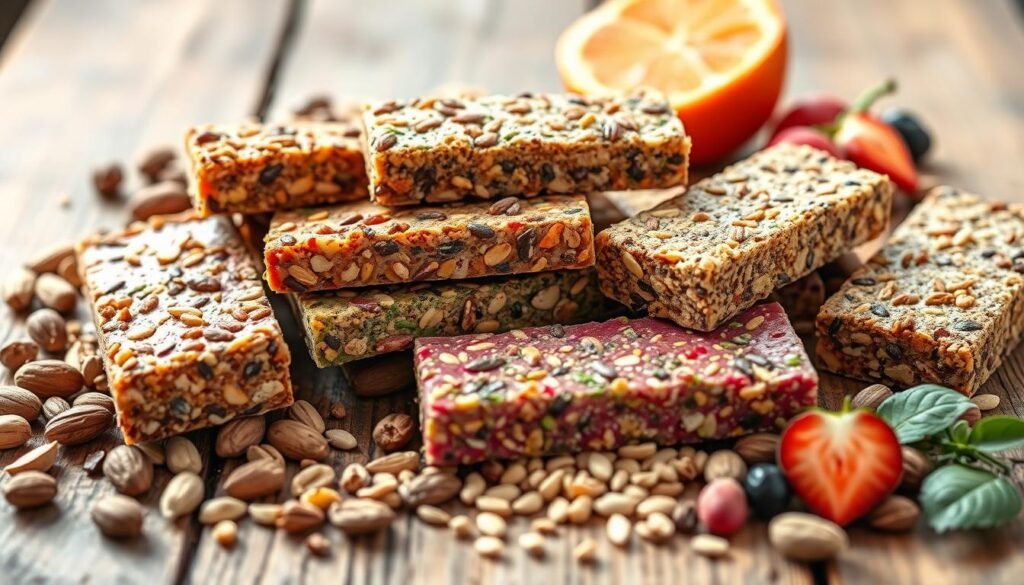
Incorporating Plant-Based Protein Bars into Your Diet
Plant-based protein bars, like vegan options, are great for your diet31. They are packed with protein and fiber. They also help with weight management and keep you full31. Look for bars that are low in bad fats, high in fiber, and made from good ingredients32.
Here are some tips for adding plant-based protein bars to your meals:
- Use them as a meal substitute or a healthy snack32.
- Eat them before or after working out, or as a quick breakfast32.
Real Food Protein Bars offers tasty and healthy vegan options31. They are gluten-free, non-GMO, and full of protein31. With vegan bars becoming more popular, finding one that fits your taste and diet is easier than ever31.
Plant-Based Protein Bars for Weight Management
Natural plant protein bars can be a great addition to a healthy diet for weight management. They offer a convenient and controlled amount of protein. This can help you feel full and control your weight33. Plus, many of these bars are low in calories and high in fiber, making them perfect for weight management.
Research shows that 90% of women over 40 don’t get enough protein34. This makes high protein plant-based snacks very important. Bars with 10 to 25 grams of protein per serving are great as snacks or meal replacements33. For instance, the ONE Banana Nut Bread Plant Protein Bar has 165 calories, 8 grams of fiber, and 12 grams of protein per serving35.
Here’s a look at some popular plant-based protein bars:
| Bar Name | Calories | Protein | Fiber |
|---|---|---|---|
| ONE Banana Nut Bread Plant Protein Bar | 165 | 12g | 8g |
| NuGO Slim Dark Chocolate Toasted Coconut Vegan Protein Bar | 190 | 16g | 3g |
| TRUWOMEN Zamn Good Zesty Lemon Plant-Fueled Protein Bar | 200 | 12g | 9g |
To learn more about adding high protein plant-based snacks to your diet, check out this website. Also, talking to a healthcare professional or registered dietitian can help find the best plan for you.
The Environmental Impact of Plant-Based Protein Bars
Choosing plant-based snack bars is good for the planet. They need less land, water, and energy than animal products36. This means less pollution and a smaller carbon footprint.
Plant-based diets also help prevent diseases like heart disease and diabetes36. They offer many benefits, including:
- Lower greenhouse gas emissions
- Reduced water usage
- Less land required for production
Animal farming is a big polluter, with emissions rivaling the transport sector37. But, plant foods like tofu and oats use much less water. For example, 1 pound of tofu needs 302 gallons of water, while 1 pound of oats needs 290 gallons37.
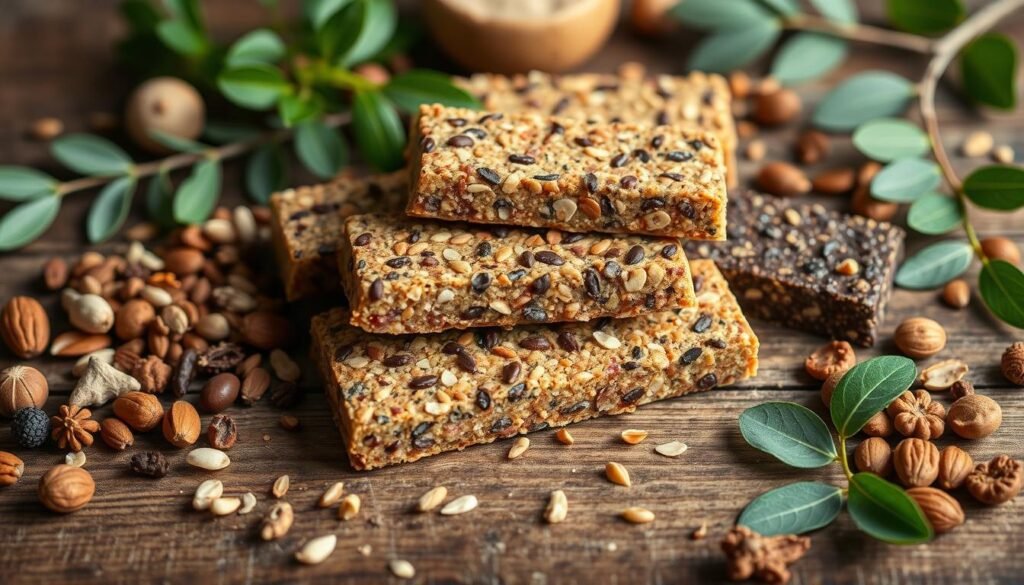
By picking the best plant-based protein bars, we help the planet. With more people wanting plant-based options, it’s key to think about our food’s impact36.
Reviews of Popular Plant-Based Protein Bars
There are many plant-based protein bars to choose from. Some are made with gluten-free ingredients and taste great. Reviews show that One Plant, Think Plant-Based Protein Bars, and NuGo Dark are favorites. They have 12g to 13g of protein per bar38.
These bars are tasty and good for you. For example, One Plant has 12g of protein from peas, rice, and nuts, with just 1g of sugar38. Think Plant-Based Protein Bars have 13g of protein and only 5g of sugar38. Some are even nut-free and gluten-free for those with special diets39.
Many plant-based protein bars are also low in sugar and high in fiber. No Cow Protein Bars have 22g of protein and only 1g of sugar38. ALOHA bars offer 14g of protein per serving40. With so many choices, you can easily find a bar that fits your needs.
Some brands offer benefits like being low in sugar and gluten-free. They are also vegan-friendly and great for post-workout or on-the-go39. When picking a bar, look at the ingredients, nutritional info, and what others say to find the best one for you.
Tips for Storing Your Protein Bars
Keeping plant-based protein bars fresh and tasty is key. Most bars last 6 to 12 months if stored right41. To keep them fresh, store them in a cool, dry spot. Make sure they’re away from heat and humid places42.
Here are some tips for storing your protein bars:
- Keep them in an airtight container to maintain freshness
- Store them in a pantry or kitchen cabinet, away from direct sunlight
- Check the expiration date and consume before it expires
The type of protein bar also matters. High-sugar bars might last longer but can get hard. Low-sugar bars have a shorter shelf life but stay softer41. Also, plant-based protein powders last longer than dairy-based ones43.
By following these tips, you can enjoy your plant-based protein bars and vegan protein bars for a longer period. This way, you keep their nutritional value and taste.
| Storage Conditions | Shelf Life |
|---|---|
| Cool, dry place | 6-12 months |
| High-humidity area | 3-6 months |
Always check the expiration date. Eat your protein bars before they expire for the best taste and nutrition41.
Conclusion: Embrace the Benefits of Plant-Based Protein Bars
Plant-based protein bars are a healthy and eco-friendly choice. They are packed with nutrients and good for the planet. Adding them to your diet can bring many benefits44.
These bars help with your health and fitness goals. They give you the amino acids you need, help your muscles recover, and boost your brain. They’re great for anyone who’s active or cares about their health45.
Why not try plant-based protein bars? They’re perfect for a quick snack or to boost your workout. They offer a tasty and nutritious way to improve your health. Start enjoying the benefits of plant-based nutrition today4445.
FAQ
What are plant-based protein bars?
What are the key ingredients in plant-based protein bars?
What are the benefits of choosing plant-based protein bars?
What are the different types of plant-based protein bars?
How can I choose the right plant-based protein bar for me?
Can I make my own plant-based protein bars at home?
Where can I buy plant-based protein bars?
How do plant-based protein bars compare to traditional protein bars?
What should athletes consider when choosing plant-based protein bars?
What are some common myths about plant-based protein bars?
Do plant-based protein bars provide enough protein?
Are all plant-based protein bars high in sugar?
What is the future of plant-based protein bars?
Source Links
- Vegan-Friendly Supplements
- Vegan and Plant-Based Pea Protein Bars | 15 Grams Per Bar
- 15 Healthy Vegan Protein Bars
- 5 Reasons You Need A Vegan Protein Bar
- Vegan Protein Bars and Muscle Gain: Myths and Truths
- Plant Based Protein Power | Your Guide to Vegan Protein Bars
- 10 Best Vegan Protein Bars: Expert Tested and Reviewed (2025) | Garage Gym Reviews
- The best vegan protein bars, tried and tested
- Plant Based Protein Bars
- Your Comprehensive Guide to Plant-Based Protein Bars
- Vegan Protein Bars
- Gluten Free Vegan Protein Bars (Plant Based Energy)
- Homemade Vegan Protein Bars (no bake)
- Vegan and Plant-Based Pea Protein Bars | 15 Grams Per Bar
- Your Comprehensive Guide to Plant-Based Protein Bars
- Vegan Protein Bars vs. Traditional Protein Bars: Which is Better for Your Health and Fitness Goals?
- The Benefits Of Plant-Based Protein Bars
- Considering protein supplements for plant-based athletes
- The No-B.S. Guide to Vegan Protein
- Nutritional Considerations for the Vegan Athlete
- Plant-Powered Truths: Separating Fact from Fiction in the World of Protein
- Debunking Protein Myths: The Truth About Plant-Based Proteins vs. Animal Proteins – WeviveIndia
- 9 Myths, Busted: Here’s the Truth About Good-for-You Protein Bars
- Your Comprehensive Guide to Plant-Based Protein Bars
- The Benefits of Vegan Protein Bars: Why They Are a Great Source of Plant-Based Nutrition
- Low Sugar Protein Bars – ALOHA
- Mezcla | Plant Protein Bars | Shop Now
- Peanut Butter Chocolate Chip Protein Bar
- The Future of Protein Bars in 2024: Trends and Innovations
- Global Demand for Vegan Protein Bars is projected to reach US$ 3,965.7 million by 2033: Future Market Insights, Inc.
- 5 Reasons You Need A Vegan Protein Bar
- 6 Reasons Why Plant-Based Protein Bars Are Better Than Animal Protein
- Plant Based Protein Bars
- Plant-Based Metabolic Boosting Protein Bars with Prebiotic Fiber + Ome
- The Healthiest Vegan Protein Bars on the Market
- Plant-Based Diets: Considerations for Environmental Impact, Protein Quality, and Exercise Performance
- The Case for Plant Based | UCLA Sustainability
- Vegan Protein Bars: Are they a necessary evil? I review a few for you.
- The 12 Best-Tasting Vegan Protein Bars to Grab on the Go
- The 16 Best Vegan Protein Bars
- Protein Bars Shelf Life: How Long Do They Last? Storage Tips for Freshness
- Protein Powder: How to Store It Properly
- How to Store Protein Powder? Tips and Best Practices
- Why Is Everyone Talking About Plant-Based Protein?
- How Plant-Based Protein Supports Muscle Growth and Recovery – Plant Powered Athlete



